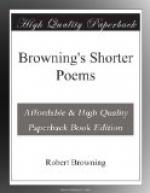The real question with Browning, as with any poet, is, What is his work and worth as an artist? What of human life has he presented, and how clear and true are his presentations? What passions, what struggles, what ideals, what activities of men has he added to the art world? What beauty and dignity, what light, has he created? How does he view life: with what of hope, or aspiration, or strength? These questions may be discussed under his sense and mastery of form, and under his views of human life.
Browning’s sense of form has often been attacked and defended. The first impression upon reading him is of harshness amounting to the grotesque. Rhymes often clash and jangle like the music of savages. Such rhymes as
“Fancy the fabric...
Ere mortar dab brick,”
strain dignity and beauty to the breaking-point. Archaic and bizarre words are pressed into service to help out the rhyme and metre; instead of melodic rhythm there are harsh and jolting combinations; until the reader brought up in the traditions of Shakespeare, Milton, and Tennyson, is fain to cry out, This is not poetry!
In internal form, as well, Browning often defies the established laws of literature. Distorted and elliptical sentences, long and irrelevant parentheses, curious involutions of thought, and irregular or incoherent development of the narrative or the picture, often leave the reader in despair even of the meaning. Nor can these departures from orderly beauty always be defended by the exigencies of the subjects. They do not fit the theme. They are the discords of a musician who either has not mastered his instrument or is not sensitive to all the finer effects. Some of his work stands out clear from these faults: A Toccata of Galuppi’s, Love Among the Ruins, the Songs from Pippa Passes, Apparitions, Andrea del Sarto, and a score of others might be cited to show that Browning could write with a sense of form as true, and an ear as delicate, as could any poet of the century, except Tennyson.
To Browning belongs the credit of having created a new poetic form,—the dramatic monologue. In this form the larger number of his poems are cast. Among the best examples in this volume are My Last Duchess, The Bishop Orders his Tomb, The Laboratory, and Confessions. One person only is speaking, but reveals the presence, action, and thoughts of the others who are in the scene at the same time that he reveals his own character, as in a conversation in which but one voice is audible. The dramatic monologue has in a peculiar degree the advantages of compression and vividness, and is, in Browning’s hands, an instrument of great power.
The charge of obscurity so often made against Browning’s poetry must in part be admitted. As has been said above he is often led off by his many-sided interests into irrelevancies and subtleties that interfere with simplicity and beauty. His compressed style and his fondness for unusual words often make an unwarranted demand upon the reader’s patience. Such passages are a challenge to his admirers and a repulse to the indifferent. Sometimes, indeed, the ore is not worth the smelting; often it yields enough to reward the greatest patience.




